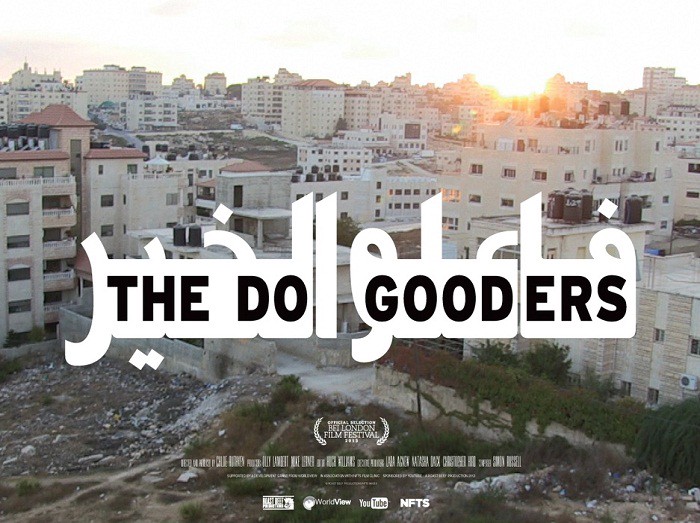Chloe Ruthven’s first feature, Mario and Nini, followed two nine-year-old boys over five years, as she struggled to help them find alternatives to
a life of crime. The film premiered at Sheffield Documentary Festival in 2008, and bought by Sky 1, where it was widely reviewed. Her second feature, Death of a Hedgefund Salesman, which looked at the banking crisis through her oldest friend turned chancer, won the Best Newcomer Award at Open
City Docs in 2011. The Do Gooders is her third feature. When not making films, Chloe works with disadvantaged young people across London schools.
In 2011 she started The Quadrangle Film Festival with a group of fellow filmmakers.
The Do Gooders
will be playing
as part of the London Film Festival.
Women and Hollywood: Please give us your description of the film playing.
Chloe Ruthven: The film is a documentary called The Do Gooders — and it’s really a personal road trip into the world of Western do-gooding and aid
in the Middle East — focusing on Palestine, where my (British) grandparents worked. As I become more upset by what I am seeing there — an aid
industry completely removed from the needs of the people, I hook up with a beautiful Palestinian activist called Lubna to help me. We become a guerrilla
style Thelma and Louise taking on the UN and USAID among others. But soon our relationship runs into trouble, as the bigger East/West power imbalances are
reflected in a growing mistrust between us.
WaH: What drew you to this story?
CR: I grew up in a household (rural Ireland and England) where adults were always angry about what was happening in the Middle East. In 1960, my
Grandparents had driven across Europe in an old land rover full of blankets and medicine to help the Palestinians refugees who were fleeing Israel.
My grandparents felt personally responsible for the hundreds of thousands of displaced Palestinians, as Britain had withdrawn from the region in 1947
leaving the Arab population to fend for themselves. I was always fascinated as a child by why all the adults would be fussing about these people who lived
so far away, rather than just get on with their lives. I always wondered whether ‘helping others’ was as much about avoiding things at home and making
yourself feel better, as it was about the people you claim to help. I was also struck by how one-way help seemed. You don’t get Palestinians coming to our
schools and communities to help our growing dysfunctional and fractured families in the UK for instance.
WaH: What was the biggest challenge?
CR: The biggest challenge was not giving up! It has taken three years to make, 2 edits, 3 producers and 3 shoots — plus a huge financial hole. I was very
close to giving up last year after a few hard knocks from funders and commissioners. But after a month under the duvet, I got back on the horse and came at
it again. I think as an indie filmmaker, we have to be making our work for a reason other than external validation. As soon as I ‘let go’ everything fell
into place.
WaH: What advice do you have for other female directors?
CR: Don’t be anything other than yourself. Just because the film industry was invented by men, it doesn’t mean they’ve got it right — so work in your own
way, from the heart, with love and understanding. And don’t try and compete on their terms — as it is coming our way now anyway.
WaH: What’s the biggest misconception about you and your work?
CR: I’m not well known enough for people to have conceptions about me, apart from close friends and family. I think my friends and parents always thought I
was a bit mad and wouldn’t ever complete a film — this is my third — so they are expressing surprise. I have no formal training — only art school — so some
industry people perhaps didn’t get it.
WaH: Do you have any thoughts on what are the biggest challenges and/or opportunities for the future with the changing distribution mechanisms for films?
CR: In indie documentary the television commissioners are not reflecting the growing interest in feature-length documentaries that people have. The
gate-keepers so to speak, are not with the programme. So the internet is a very exciting prospect for filmmakers like me, as long as we can get some kind
of remuneration for our hard work.
WaH: Name your favourite women directed film and why.
CR: Jane Campion’s An Angel at My Table, blew me away when I saw it aged 15. I didn’t know cinema could go so deep — that I could have my world
view and inner self so transformed through identification with a young women suffering from mental instability. It took me days to recover from the
experience.







